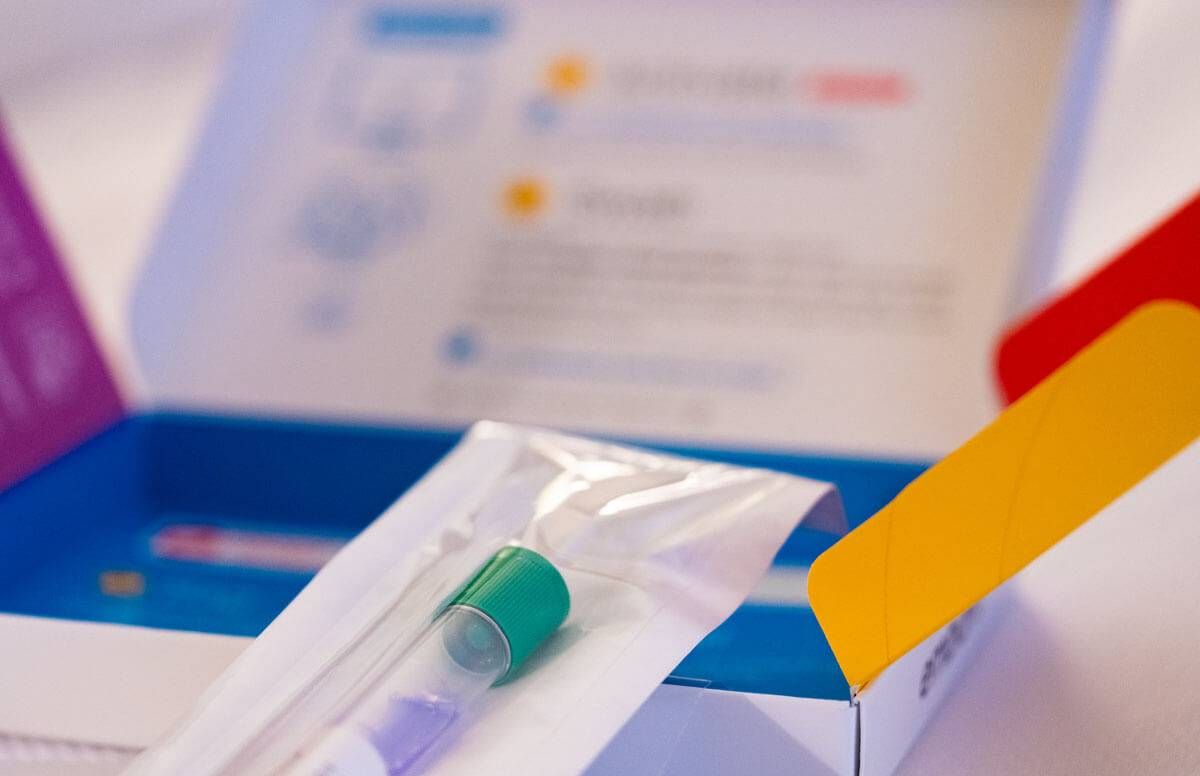Why You Shouldn't Rely on Home DNA Tests for Health Information
For crucial information, it's best to work with a physician or genetic counselor
It seems like everywhere you look these days, another DNA testing company is urging you to check out your ancestry, discover whether you’re at risk for a chronic disease or learn how your genes affect your running performance.

The global direct-to-consumer genetic testing market is big business — projected to top $22 billion by 2024. But can a test from a little bit of saliva really tell you whether you’ll get Alzheimer’s disease or be able to reach the body weight you desire?
It’s buyer beware, say genetics experts. While these DNA tests may sometimes answer a very small piece of the genetic puzzle, they can’t give you the complete picture.
"These tests are fun, but shouldn't be taken as a final answer, whether results are positive or negative."
Results can be inaccurate, and even the testing companies agree they shouldn’t be used as the sole basis of health care decision making.
Here's how the process works: For a few hundred dollars, you swab your cheek or spit into a test tube and then send the results to one of the many commercial DNA testing companies. In a few weeks, you receive a report that can tell you whether you may be at risk for one or more diseases, whether you may pass that risk on to your children, how your genes affect your fitness potential or even how much your face will wrinkle.
However, these commercial, direct-to-consumer tests are not the same as those recommended by a physician or a genetic counselor, and should be viewed only as a starting point for a conversation with a professional, says Carolyn Applegate, a certified genetic counselor at Johns Hopkins School of Medicine.
“These tests are fun, but shouldn’t be taken as a final answer, whether results are positive or negative,” she says.
Genes Are Only One Consideration
Many different factors make you who you are. Variants in our common DNA are what determine traits like eye and hair color, height or whether you’ll go bald. Some variations in how genes are arranged can also give clues about a person’s risk for heart disease, cancer and other conditions. Companies like 23andMe, Orig3n, Ancestry, LivingDNA and others only test for a small handful of markers among some 3 billion human genes.
“So, if you have or don’t have a mutation in a particular gene they test for, it’ll tell you that,” says Applegate.
But the meaning of that information is different for every individual, depending on factors like family history, lifestyle, environment, diet and more.
And, the results from commercial tests may not always be accurate.
A 2018 study of commercial DNA tests, in the journal Genetics in Medicine, found that 40% of variants in raw data were false positives. Some results that indicated “increased risk” were actually considered harmless by other clinical labs or were simply common variations in populations.
This doesn’t mean all commercial tests are bad. But they shouldn’t be taken as the final word on risk, says Matthew Ferber, director of Mayo Clinic’s Clinical Genome Sequencing Laboratory in Rochester, Minn.
One positive effect of direct-to-consumer DNA tests: “Some of these tools allow people to become engaged and learn about genetics in ways they otherwise wouldn’t,” Ferber says.
We don’t have a good handle on how genetics really affects our muscle mass, our body mass index or what foods we should eat to maximize our longevity, Ferber says. “But if someone thinks that by taking this test, they know if they’re going to live another ten or fifteen years, that’s not going to happen,” he says.
How Valid Are These DNA Tests?
The Food and Drug Administration (FDA) oversees some of these DNA tests, but not all.
Generally, non-medical, wellness DNA tests — such as for ancestry or athletic ability — are considered “low-risk” by the FDA and are not reviewed by the agency. The FDA does oversee moderate- to high-risk DNA tests that claim to determine the likelihood of developing diseases such as diabetes, cancer or Alzheimer’s.
But the FDA only reviews a test’s validity. That is, whether the test accurately and reliably measures what it claims to measure and delivers what the company claims it does.
One FDA-approved test looks for three variants in the BRCA 1 and BRCA 2 genes, which are linked to breast cancer risk in certain sub-populations of women.
For example, “If you’re Ashkenazi Jewish and you have one of those three variants, there’s a pretty good chance that if you’re at increased risk for breast cancer, you would be positive on that test,” says Applegate.
That’s because those three variants are most common in people of Ashkenazi Jewish descent. But if you’re not of that heritage, that test will do nothing for you, because you would not be expected to have those three variants.
What Negative Results Do and Don't Mean
Still, negative results from a DNA test don’t eliminate breast cancer risk.
“We worry in the medical community about people being falsely reassured by that information,” Applegate says.
Even the FDA warns: “This test only reports three out of more than 1,000 known BRCA mutations and a negative result doesn’t rule out increased cancer risk.”
If you happen to be one of those people, and if you happen to have one of those variants, it’s an extremely valuable result. But it only applies to a small subset of a subset of the population, Ferber says.
Many testing companies now place disclaimers on their websites and in their testing kit instructions. However, they can be difficult to find and decipher. Ferber commends the attempt at disclosure but points out that many consumers don’t read the fine print and don’t really understand what these tests really tell them.
“It’s easy for people to be confused about what’s in or not in the test. What the really thoughtful groups have done is to be very transparent about the balance between genetics and your environment,” he says.
Privacy issues associated with commercial DNA tests are another concern. Ferber advises consumers ensure they understand and agree to the types of information these companies collect and how they may share it with third parties. Know what you will and won’t get for your money, and what data you're agreeing to hand over, perhaps, forever.
Interpretation of Results Is Key
If you do decide to get your DNA tested, interpreting the results can be another source of confusion and anxiety. While some companies offer access to consultations with genetic counselors, not all do.
“It’s important to seek the advice of a physician or genetic counselor, regardless of whether your test results were positive or negative,” Applegate says.
A professional will take a complete family history to better interpret those results and what they might mean for an individual.
A physician or genetic counselor will try to assess what your concerns are, what you would do with that information and whether a different clinical test is more appropriate. Many of the more precise clinical tests are covered by insurance, although it’s always wise to double check with your insurer.
Remember, genetics isn’t everything when it comes to your health. If you do decide to take a DNA test, Ferber suggests looking for a recognized and reputable provider who offers counseling.
Also, make sure the provider uses a high-quality clinical lab that adheres to federal standards.
And don’t be lulled into a false sense of security by negative results.
Regardless of what is or isn’t found, engage in the old tenets of eating well, exercising, not smoking and not abusing alcohol or drugs. This approach will do much to help you live longer and healthier.


